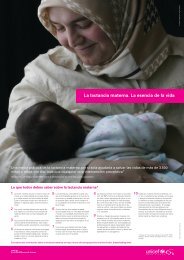SEXUAL ABUSE AND EXPLOITATION OF BOYS IN SOUTH ASIA A ...
SEXUAL ABUSE AND EXPLOITATION OF BOYS IN SOUTH ASIA A ...
SEXUAL ABUSE AND EXPLOITATION OF BOYS IN SOUTH ASIA A ...
You also want an ePaper? Increase the reach of your titles
YUMPU automatically turns print PDFs into web optimized ePapers that Google loves.
Previous legislation stated that sexual intercourse with any child under 14 was considered<br />
rape, as the child could not properly give consent. Today, rape is addressed under the Hudood<br />
Ordinance, which supersedes the Penal Code. However, this law is punitive rather than<br />
protective, as a child of any age can be convicted of having illicit sexual relationships. It<br />
prescribes adult penalties for girl from age 16 or from the time she has menstruated,<br />
whichever is earlier. For boys it prescribes adult penalties from the age of 18. In this respect,<br />
boys fare than girls better under the law, as the punishment for children is considerably less<br />
than for adults. The Hudood Ordinance discourages girls and women from prosecuting rape<br />
cases as their testimony alone is not sufficient; rape can be proven only with the testimony of<br />
four adult males. Should this testimony not be provided, the girl or woman can be convicted<br />
of illicit sexual activity and severely punished.<br />
After much advocacy by legal rights groups against the Hudood Ordinance, the Protection of<br />
Women (Criminal Laws Amendment) Act was enacted in 2006. It amends some of the<br />
provisions in the Hudood Ordinance and transfers some offences to the Pakistan Penal Code.<br />
This Act affects the application of the Hudood Ordinance especially in matters relating to<br />
sexual crimes, such as rape. It does not remedy the omission of boys from protection under<br />
either the Hudood Ordinance or the Penal Code.<br />
Under the Protection of Women Act, rape is an offence under the Penal Code, and<br />
convictions are to be based on evidence. The Act also prohibits charging women with<br />
fornication offences in cases where they allege they were victims of rape but cannot prove<br />
their ‘absence of consent’ through the production of four male witnesses. At the same time,<br />
activists consider the Protection of Women Act insufficient in addressing the discrimination<br />
found in the Hudood Ordinance, as it still allows the judiciary to interpret the law according<br />
to strict orthodox precedents. Heterosexual consensual sex outside of marriage continues to<br />
be criminalized, although it provides that such complaints are to be investigated by a court<br />
before formal charges are laid. Human Rights Watch has criticized the Act, stating that it does<br />
not comply with Pakistan’s obligations under the Convention on the Elimination of All Forms<br />
of Discrimination against Women. The UN Special Rapporteur on freedom of religion or<br />
belief has stated that sentences of stoning and amputation for ‘adultery’ and other offences are<br />
still possible under the Act. 352<br />
While the Hudood Ordinance applies, albeit severely, to girls, it has no application to the rape<br />
of boys, as rape is considered to be vaginal penetration. Thus the Hudood Ordinance appears<br />
to apply only to heterosexual rape of females by males. In the Pakistan Penal Code as well,<br />
the offence of rape is defined by vaginal penetration; only men are perpetrators and only<br />
women are victims. 353 A 1997 amendment to the Hudood Law provided severe penalties,<br />
including the death penalty, to those found guilty of sodomy with a child as well as those<br />
committing gang rape.<br />
The rape of boys, or sodomy, is also addressed under the Pakistan Penal Code, which<br />
punishes a person who ‘has carnal intercourse against the order of nature with any man,<br />
352 Jahangir, A., 2007, ‘Presentation on the topic of religion and human rights at the University of Ottawa,<br />
Canada, 22 October 2007’.<br />
353 Pakistan Penal Code, Section 375.<br />
114










